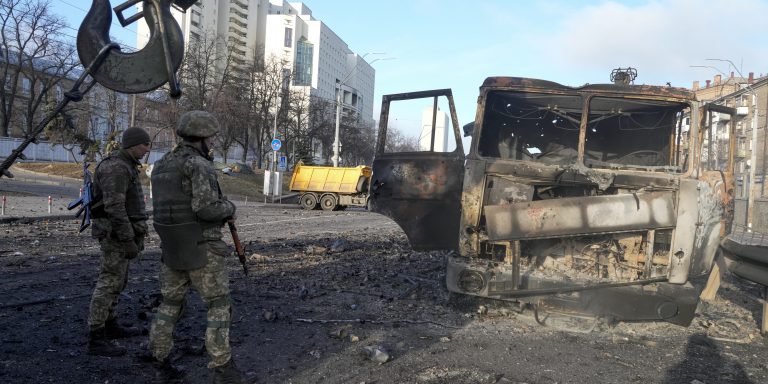INTELBRIEF
April 1, 2022
IntelBrief: With Russian Military Bogged Down in Ukraine, Pressure on Putin Builds

Bottom Line Up Front
- As the losses of Russian troops continue to mount, including numerous generals who have been killed, there are reports that Russian President Vladimir Putin is purging elites within the security services.
- With pressure mounting on Putin after his ill-fated invasion of Ukraine, including from the oligarchs who now find themselves under crushing sanctions, some have speculated about the possibility of a palace coup.
- According to the White House, Putin feels betrayed by his top military officials, which has “resulted in persistent tension between Putin and his military leadership,” an assessment based on declassified intelligence.
- The Russian state has maintained a stranglehold on the media, working hard to ensure that the horrors of what is happening in Ukraine remain hidden from the Russian people.
As the losses of Russian troops continue to mount, including numerous generals who have been killed, there are reports that Russian President Vladimir Putin is purging elites within the security services. By many accounts, Putin is furious at his intelligence services for failing to predict Ukraine’s fierce resistance. There have already been several public displays of Putin’s anger directed toward his intelligence chiefs, including at the meeting of the Russian Security Council, a video deliberately aired by the Kremlin, where Putin berates and belittles Sergei Naryshkin, the director of the foreign intelligence service (SVR), the successor agency of the infamous KGB. According to the New Yorker, two top-level officials from the FSB, the Federal Security Service, were placed under house arrest. Because previous Russian incursions—Georgia in 2008 and Crimea in 2014—resulted in manageable blowback for the Kremlin, Putin likely assumed that his 2022 invasion of Ukraine would result in similar controllable outcomes.
With pressure mounting on Putin after a month into his ill-fated invasion of Ukraine—including from some of the Kremlin’s closest allies, oligarchs who now find themselves under crushing sanctions—some have speculated about the possibility of a palace coup. Adding to Putin’s paranoia, U.S. Senator Lindsey Graham called for Putin’s ouster, tweeting, “The only way this ends is for somebody in Russia to take this guy out. You would be doing your country – and the world – a great service.” Whether the siloviki, the Russian security men who form Putin’s innermost circle and are tasked with protecting him, would attempt to take Putin out is anyone’s guess, although the possibility seems rather remote. But dissent continues to percolate. In early January, a group of retired and active Russian military officers published an open letter labeling an invasion of Ukraine as “pointless and extremely dangerous” with the potential to cast doubt upon “the existence of Russia itself as a state.”
Even before Russia invaded Ukraine, U.S. intelligence has called out Moscow’s plans for all to see, preempting potential ‘false flag’ operations and countering Russian disinformation campaigns with visible evidence of Russian war planning. The strategy has been a success, as has covert training and support provided by Western intelligence agencies to the Ukrainian military, which has been impressive in countering Russian military assaults. Russian Minister of Defense Sergei Shoigu, a close Putin ally, has also come under fire for the poor performance of the Russian military. According to the White House, Putin feels betrayed by his top military officials, which has “resulted in persistent tension between Putin and his military leadership,” said White House communications director Kate Bedingfield, referencing recently declassified intelligence. In a recent speech the Director of the United Kingdom’s GCHQ, the UK's intelligence, security and cyber agency, also intimated that Putin was receiving inaccurate accounts of Russia’s position on the battlefield and stressed the value of early and rapid declassification of intelligence in this conflict which had constrained Russia’s operating space.
Domestically, Putin has continued to clamp down on anti-war protests or even the slightest hint of dissent among the Russian population. The Russian state has maintained a stranglehold on the media, working hard to ensure that the horrors of what is happening in Ukraine remain hidden from the Russian people. In an autocratic system like Russia’s, the blame for a debacle like the invasion of Ukraine should squarely rest with the ultimate decision-maker, Putin. But instead, the Russian leader is reportedly seeking to blame others around him, deflecting responsibility and attempting to maintain a stoic appearance in the face of clear setbacks to his strategy. Putin’s leadership style also suggests that his underlings are fearful of telling him the truth, so instead the information that reaches him is often seen through rose-tinted glasses, overly optimistic about the state of the invasion and omitting some of the reports about Russian military incompetence and apathy. If nothing else, Putin is a survivor, and has extricated himself from difficult situations many times in the past. But things may be different this time and Putin’s gamble may ultimately be the death knell for a regime built upon brutality and lies, leading to a dangerous endgame in Russia.